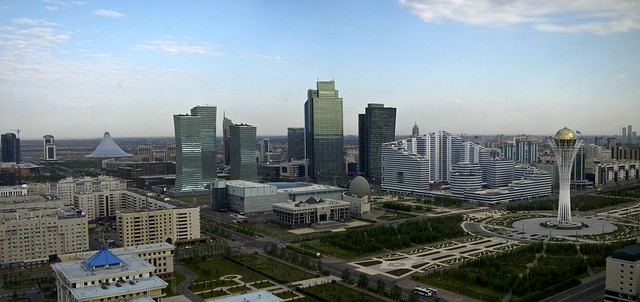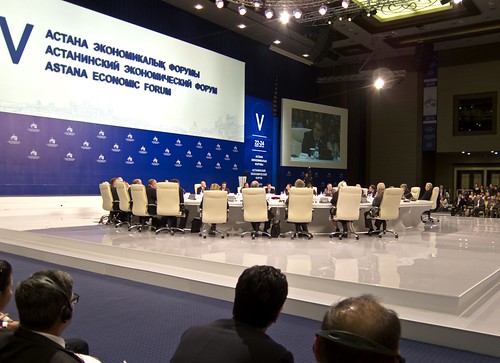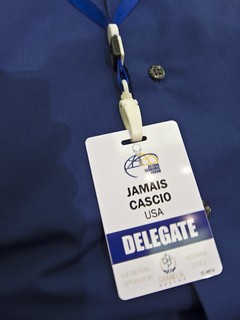Astana: Impressions
If you follow my Twitter stream (or my Flickr account), you'll know that I just got home from a week in Kazakhstan, participating in the Fifth Astana Economic Forum, or AEF.
Kazakhstan is a geographically massive but lightly-populated Central Asian country, spinning off 20 years ago from the Soviet Union. Its population is a mix of ethnic Kazakh and ethnic Russian, with both languages spoken almost interchangeably. Economically, it's a big exporter of raw materials, and is apparently sitting on quite a bit of oil and natural gas. Its president Nursultan Nazarbayev, has been in charge since 1990 (and if you're playing along at home, you'll note that this is prior to the split with the USSR), showing no signs of wanting to move along from the position.
Astana became Kazakhstan's capitol about a decade ago, shifting rapidly from a sleepy town to a modern city. My first impression upon arrival (one that a couple of other attendees mentioned having) was that of Las Vegas -- lots of bright lights, diverse and showy architecture, all in the middle of desolation. The architectural diversity is worth calling out; if you like unique-looking, retro-futuristic skyscrapers, you'd love Astana.

On the surface, Astana seems like any other global city (smooth roads, reliable power, strong mobile signals, etc.), but just stepping outside the center of the "new city" is a reminder that Kazakhstan is very much a developing nation, one that is heavily dependent upon extractive industries. Small but telling example: in the "ethno-memorial complex" called Atameken (a park in the shape of the country, with miniature dioramas depicting aspects of Kazakh society and history), the very first model you see is that of mining/oil drilling.

It should come as no surprise, then, that the AEF, which bills itself as being a forum for discussion of "solutions to socio-economical, legal and cultural issues of Kazakhstan and the world's economic development," is so heavily dominated by mining and fossil fuel industries. Again, a small but telling example: in the opening plenary, alongside speeches from Nazarbayev, Prime Minister Edrogan of Turkey, and a UN representative, we got to hear from the CEO of ExxonMobil.
Energy companies are hungry to get access to Kazakhstan's resources. I saw this first hand. Much to my surprise, I was asked at nearly the last minute to be the "moderator" for a panel on the future of fossil fuels, a panel that doubled in size in the final week prior to the event. The 90 minutes essentially consisted of high-level executives from places like Conoco-Phillips, SA Total, the World Petroleum Council, and numerous others going on and on about how rich Kazakhstan is going to be. Oh, and how unimportant renewables will be for the next fifty years, at least. (Efforts on my part to push the conversation were undermined by a format of too little time for executives unused to being brief.)
One thing that didn't come up was the big presence of China in the oil industry here -- SINOIL is a major refiner, buying up Kazakh oil then selling it back to them as gasoline. In fact, now that I think of it, China -- a country which borders Kazakhstan, and is said to have a bit of importance in the global economy these days -- was conspicuous by its absence throughout the Forum.
The panel for which I was a speaker, not a moderator, went much better. But even here, in a panel on sustainable development, much of the conversation orbited around the idea of seeing just how much fossil fuel development Kazakhstan could get away with. My talk (you can see the slides I used here), which went from an originally-scheduled 30 minutes down to 10 minutes, tried to talk about the conditions under which sustainable development would be occurring over the next 20-30 years. Had I known how the panel was to go, I would have done something with more detail on the environmental context.
The most notable part of the event was the roundtable discussion on the final night, bringing together political leaders (current and former Prime Ministers and Presidents), a half-dozen Nobel Prize laureates in economics, a couple of executives and a couple of media figures to talk about the world's economic situation. About a quarter of the way in, I started "live tweeting" the event -- I simply couldn't believe what was being said, and I knew that others would have the same kind of aghast reaction.
(Storify user Eric Calkins assembled my posts into a coherent stream, which was then shared around the web. You can see it here.)

Again, a single telling example: in the 90 minutes of the discussion, unemployment was mentioned once (about 45 minutes in), and briefly, while inequality or similar concepts never came up. What received the most attention was the need for even more austerity (and how to handle the annoying groups of citizens who don't like it), alongside casual discussions of tossing Greece out of the EU.
Here's the problem: AEF is a prime example of how the global conversation about development and economics takes place without much regard for anything beyond the interests of the most wealthy and powerful. This is hardly a surprise; what was surprising was the utter lack of subtlety about it. Nobody bats an eye at the obsequiousness of Nobel laureates and global media executives towards the President-for-Life of an up-and-coming petrokleptocracy. Jokes are made about how democracy is ruined by having to rely on voters. The fate of the planet gets decided over bad (and infrequent) coffee and semi-functional translation.
And I was there as a witness.

(You can see the full set of images from my trip on Flickr.)





